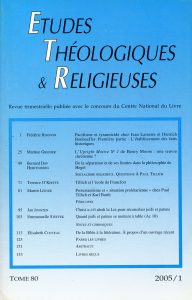La thèse de cet essai est que la Parabole du Bon Samaritain fournit une clé exégétique importante pour la compréhension de la Torah (Loi/Orientation) dans la pensée de Jésus. Le prêtre et le Lévite représentent une certaine méthode d’interprétation avec laquelle le Juriste de l’histoire se sent manifestement en sympathie, mais rejetée par le Maître. Le Samaritain est aux antipodes des clercs et autres autorités morales du peuple, mais il démontre une compréhension de la Loi marquée par le principe de surabondance de l’amour. Celui-ci, loin d’être « anomiste », radicalise la portée de la Torah par le refus de toute définition restrictive du « prochain ». Mon prochain est celui que je fais proche. Tout dépend de moi et non d’une quelconque qualité (ou déficience) intrinsèque du blessé de la Parabole. La pratique de toute la Torah est à l’avenant, c’est-à-dire que, pour celui qui est pur, tout est pur (Tt 1,15), et, pour celui qui aime, les « autres » sont faits « semblables ». En Lc 10,37, le Juriste semble avoir été convaincu par Jésus… ce qui est loin d’être une petite affaire quand on pense qu’il lui faudra remettre en question ses options fondamentales : de la désorientation à la réorientation.
The thesis of this paper is that Luke 10’s Parable of the Good Samaritan provides an important exegetical key for the understanding of Torah/Law in Jesus’ thinking. Priest and Levite are here representing a certain method of approach, with which the Jurist of the story evidently feels at ease but is rejected by Jesus as inappropriate. The Samaritan stands at the antipode of the men of cloth and other moral authorities of the people. It is he, however, who demonstrates by his attidude the true understanding of the Law by applying the principle of love superabundance. Far from being anomistic, this is a radicalization of the Torah’s bearing while refusing any restrictive definition of « neighbor ». My neighbor is the one to whom I show neighborliness. Hence, all depends upon me in this respect, not upon whatever intrinsic quality (or deficiency) of the wounded man in the Parable. This is true of the practice of the whole Law. For the one who is pure, everything is pure (Tit. 1,15), and for the one who loves, the « other » is made « same ». In Luke 10,37, the Jurist seems to have been convinced by the Master’s argument… This is far from trivial, for it means that he will have to question all of his previous basic options : from disorientation to reorientation.
p.25-46
Auteur
LACOCQUE André
André LACOCQUE est professeur d'Ancien Testament au Theological Seminary de Chicago.
